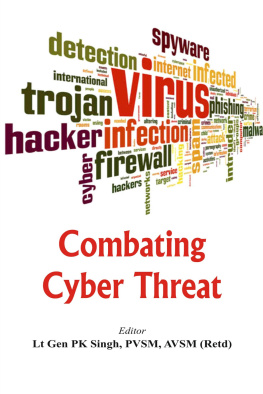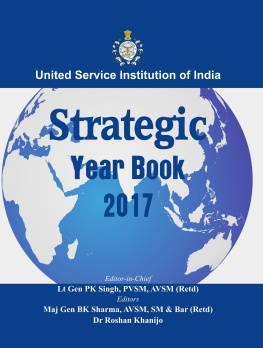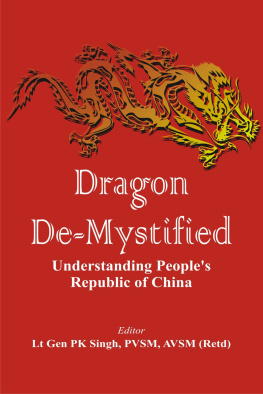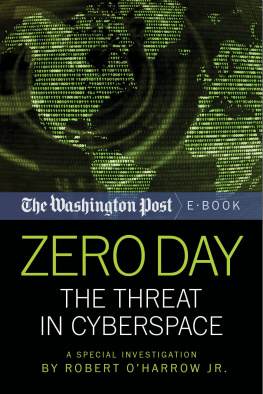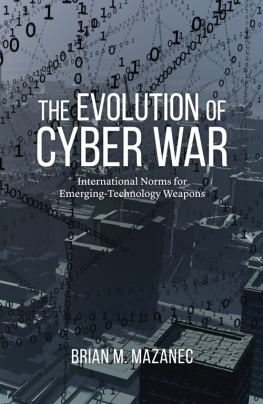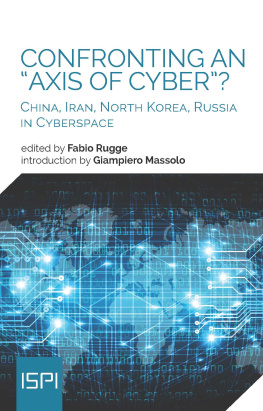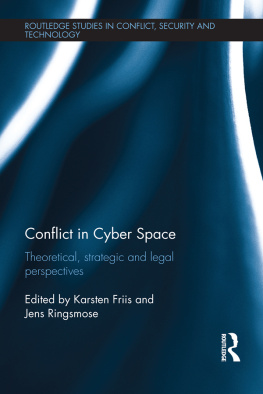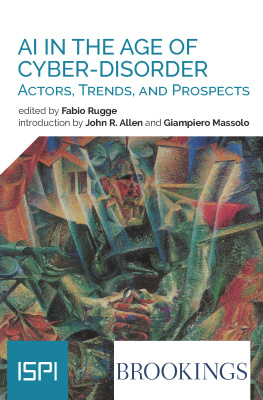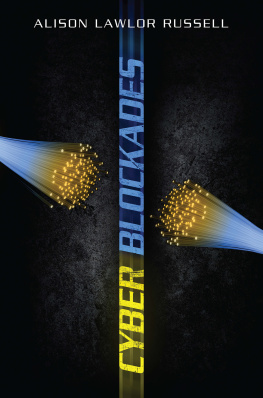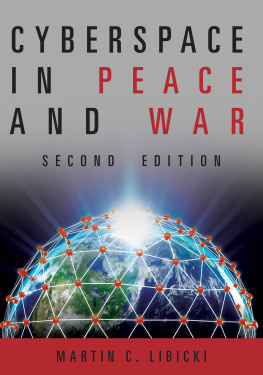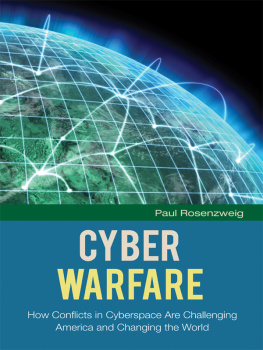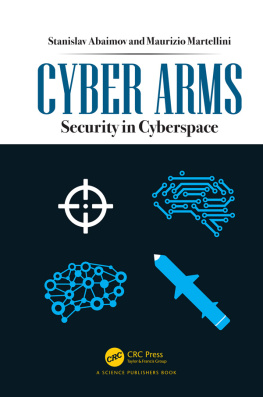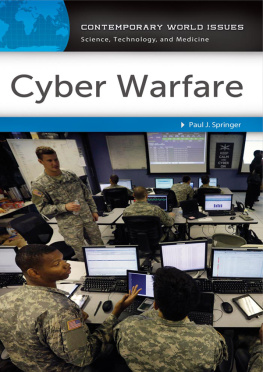Combating Cyber Threat
Combating Cyber Threat
Editor
Lieutenant General PK Singh, PVSM, AVSM (Retd)
United Service Institution of India
New Delhi
Vij Books India Pvt Ltd
New Delhi (India)
Published by
Vij Books India Pvt Ltd
(Publishers, Distributors & Importers)
2/19, Ansari Road
Delhi 110 002
Phones: 91-11-43596460, 91-11-47340674
Fax: 91-11-47340674
e-mail:
Copyright 2018, United Service Institution of India, New Delhi
ISBN: 978-93-86457-81-3 (Hardback)
ISBN: 978-93-86457-82-0 (ebook)
All rights reserved.
No part of this book may be reproduced, stored in a retrieval system, transmitted or utilised
in any form or by any means, electronic, mechanical, photocopying, recording or otherwise,
without the prior permission of the copyright owner. Application for such permission should
be addressed to the publisher.
The United Service Institution of India (USI) has been publishing its quarterly Journal since 1872. The Journal publishes articles on National Security, Military History and Defence related issues. To provide readers an insight into Indias evolving national interests, geopolitical developments in the strategic neighbourhood, conflict spectrum, measures for developing comprehensive national power and defence capability, the USI decided to bring out its Annual Strategic Year Book in 2016. The articles for the Journal and the Strategic Year Book are contributed by eminent research scholars who have expertise on the subject. With the fast changing Security environment, some of the issues which have undergone rapid changes are covered in subsequent issues, at times without any linkage to the previous issues on the subject.
It was therefore consciously though that if these articles on similar themes are brought together in an edited book form, it will provide an opportunity for the readers to link the previous articles as a background on the subject and how the things shaped with times. It will also provide the readers to get to know the mindset of different authors on the same subject and provide a different line of thinking.
Cyber Warfare is gaining special significance in todays national security aspects. This book covers articles on Cyber Security, Cyberspace, Cyber Surveillance, Cyber Warfare including Laws of War, Cyber Weapons as new weapons of mass destruction et. al.
I am sanguine that this book will provide a good platform for those who are pursuing this subject for further research work.
Editor
Norms in Cyberspace: United Nations Group of
Government Experts and Diplomatic Stasis*
Introduction
There has been a seismic shift in technological advancement in the last few decades. The proliferation of cyber networks, and their resultant impact on Information and Communication technologies (ICT), has pervaded almost every aspect of human functioning. The recent shifts in ICT functioning and the emergence of increasingly interconnected cyber networks have reduced metaphorical distances across the globe and potentially changed the ways in which nation states conceptualise their role in an increasingly hyper capitalised, multicultural, global order. The current framework of legality and ethical norm enforcement by its very essential emphasis on lived exchanges in real time is ill-equipped to deal with the hyper reality of alternative spatial and temporal constructs of existence. There is a need, therefore, to construct alternative methodologies of applying available normative/regulatory frameworks onto cyber discourse. The construction of such a framework is linked to the need for including increased predictability, trust and stability in the use of ICTs, hopefully steering states clear of possible conflict due to misunderstandings. Additionally, norms [can also be seen] as guiding principles for shaping domestic and foreign policy as well as a basis for forging international partnerships.
To this effect, several global bodies have been constituted aimed at multilateral, multinational and multi-stakeholder based regulation of cyberspace. These include the creation of transnational forums for diplomatic dialogue such as the United Nations Group of Governmental Experts (UN GGE), the International Telecommunications Union, the Internet Governance Forum, the Shanghai Corporation Organisation, the Tallinn Manual, etc. whose primary motive is the theorisation, collaboration and regulation of norms and laws concerning Cyberspace. Currently, at the international level, at least 19 global and regional organisations are actively involved in the security and governance of the cyberspace. One of these bodies is the UN GGE instituted to deliberate on the Developments in the Field of Information and Telecommunications in the context of International security. The UN GGE had its latest meeting over the course of 2016-2017 but due to the inability to conclude with a consensus, the expert body has been unable to release a consolidated report regarding the application of International Law to cyberspace. The lack of concrete norm formation and regulatory security architecture for an interconnected cyberspace is difficult to envision due to the amorphous nature of the realm itself. The ease of access to cyber technology, and the versatile nature of emergent threats Lone Wolf terrorists, Black Hat hackers, non-state actors, geopolitical rivalries cumulatively remain at the edge of transgressing State thresholds and the creation of the GGE was aimed at navigating this terrain of militarised cyberspace and infringement retaliation. This article attempts to examine the functioning of norms in cyberspace, the UN GGE as a process and specifically Indias functioning with respect to the GGE, the reasons for its failure and what might potentially lie ahead.
Norm Cycles and the UN GGE
The creation of a Norm Cycle for Cyber Discourse is primarily overseen by the United Nations. The debate concerning the emergence of ICTs and their impact on State sovereignty had first been introduced in the UN General Assembly (UNGA) regarding the field of Information and Telecommunication. As Roxanne Radu states, In what concerns security in the cyberspace, three resolutions have been on the agenda. The First Committee of the UNGA discussed the resolution on Developments in the field of information and telecommunications in the context of international security on a yearly basis starting in 1998; the Second Committee of UNGA discussed the Creation of a global culture of cybersecurity and the protection of critical information infrastructures, introduced in 2002 and adopted in 2005, and Creation of a global culture of cybersecurity and taking stock of national efforts to protect critical informational infrastructures, adopted in 2010.
Furthermore, the Assembly also outlined the need for a resolution that determined the elements aimed at protecting Critical Infrastructure. In its 11-point recommendation list, (that included Confidence Building Measures (CBMs), emergency/crisis communication networks, training exercises etc.), the assemblys resolution extrapolated on a lot of concerns that would form the basis of the various forums examining Cyber Discourse over the years.




